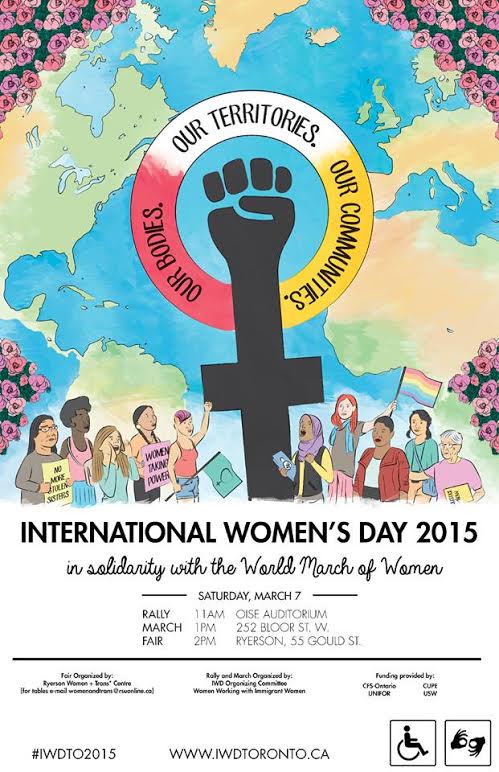Like this article? Chip in to keep stories like these coming.
March 8 is International Women’s Day (IWD). In 1917, women marched for bread and roses. In 2015, in solidarity with the World March of Women, we march to reclaim our bodies, our territories and our communities.
Often, when we think about health, we imagine hospitals and clinics. And while these sites of care are a crucial element of community health, they are still only one aspect. From the homes we live in, to the jobs we work at and the services we have access to, a wide range of factors affect our health. Our experiences with our bodies are fundamentally shaped by our status in society. Women and trans people still face high levels of violence in Canada, and this violence is markedly worse for those of us living with disabilities and for racialized and Aboriginal people.
In Toronto, this year’s International Women’s Day rally will be opened by Elder Wanda Whitebird of the Mi’kmag Nation. As an activist with No More Silence she has frequently spoken out for Missing and Murdered Indigenous Women. She says:
“Harper’s government made an apology about residential schools, but Harper won’t acknowledge the role of the state in the past genocide of Indigenous people… We can’t bring the murdered women back but we need to reveal the truth about what happened with them.”
This truth includes vast inequality where 40 per cent of Aboriginal children are living in poverty in Canada compared to 17 per cent of non-Aboriginal children. When children are living in poverty it is always an indicator that families are dealing with poor employment options and inadequate housing. This situation is worsened by ongoing cuts to services at federal, provincial and territorial levels. In the last 25 years, as funding for health care and social services has continued to decline, women and trans people are facing increased inequality.
This year’s IWD carries on the tradition of global social movements that have brought these issues of injustice to public attention for over a century. The priorities of governments that fail to respond to the needs of our communities and territories will continue to be challenged as across the country, IWD marks the launch of the World March of Women, culminating in Montreal on October 17.
In the spirit of drawing together our struggles, I will finish with a battle that the people of Leamington, Ontario are currently embroiled in. The obstetrics ward at Leamington Hospital is slated for closure. The people of Essex County have launched a campaign to save it. This Saturday, February 28 at noon, they will be taking 360 newborn baby hats to Treasury Board President Deb Mathew’s constituency office to represent the more than 360 births that happen in Leamington Hospital every year. The Ontario Health Coalition points out, “If maternity services are lost, women are at risk of giving birth on the highway and in precarious weather conditions as they travel to Windsor, more than an hour away, to deliver their babies.”
All of these fights are linked. As long as rural health care remains unequal to urban health care, as long as income inequality is rampant and as long as we still do not have a national inquiry for Missing and Murdered Indigenous Women, we will still be marching for our bodies, our communities and our territories.
The Toronto International Women’s Day Rally will be happening on Saturday, March 7 at 11 a.m. in OISE Auditorium at 252 Bloor Street West. The march begins at 1 p.m. and ends at Ryerson University where the annual International Women’s Day fair will be held at 3 p.m. by the RSU Centre for Women and Trans People.
Julie Devaney is a health, patient and disability activist based in Toronto. Her rabble column, “Health Breakdown,” is an accessible, jargon-free take on the politics behind current health-care stories. You can find her on Twitter: @juliedevaney
Like this article? Chip in to keep stories like these coming.



